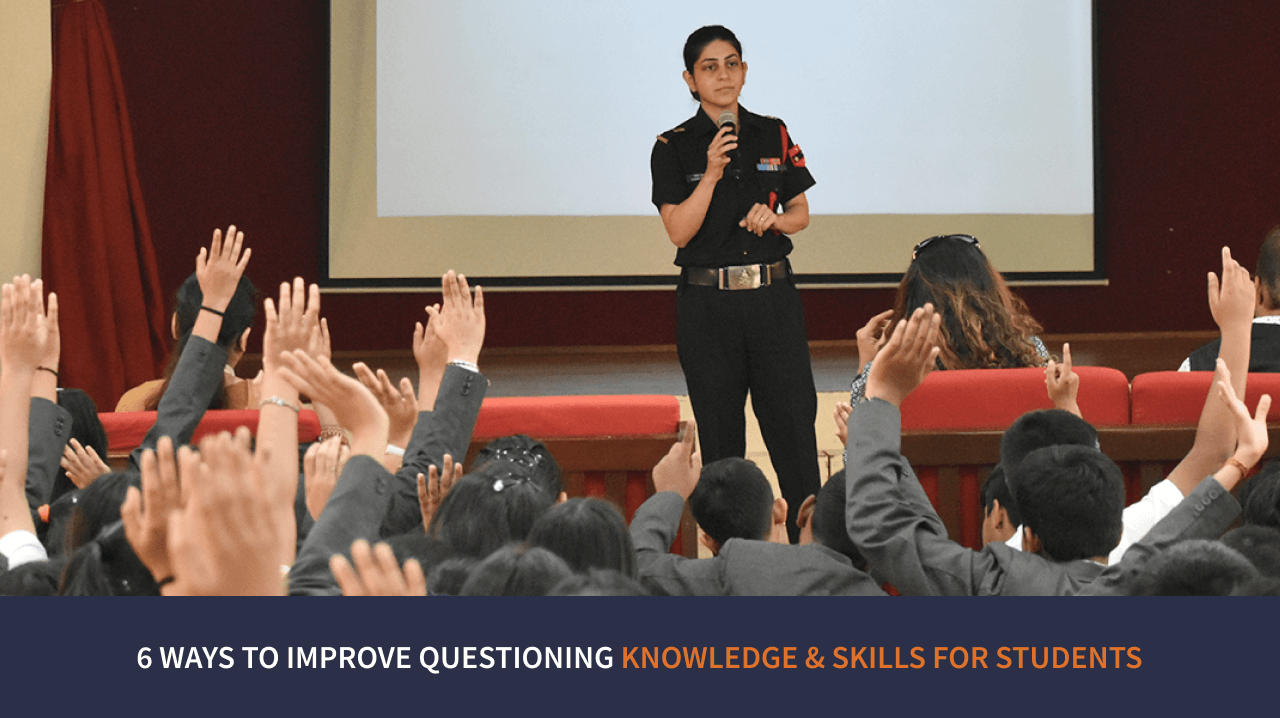6 Easy Ways to Improve Questioning Skills for Students

In today’s rapidly evolving world, critical thinking, problem-solving, and effective communication are highly valued skills. Therefore, it has become essential for students to hone their questioning knowledge and skills. The ability to ask insightful questions not only aids in gaining a deeper understanding of subjects but also plays a pivotal role in personal growth. Strong questioning abilities have far-reaching benefits, from enhancing critical thinking skills to expanding speech topics for students and providing career guidance. This blog aims to explore the significance of effective questioning skills in academic success and personal development. We will uncover six practical strategies that students can employ to enhance their questioning knowledge and skills.
Why Should You Ask Questions?
- Asking questions helps students develop critical thinking skills and enhances their ability to analyze and evaluate information.
- It fosters curiosity and a desire to learn, encouraging students to explore new ideas and perspectives.
- Asking questions promotes active learning and engagement in the classroom, leading to better retention of information.
- It helps students clarify their understanding of a topic, identify gaps in their knowledge, and seek further information.
- Asking questions can improve communication skills and confidence, as students learn to articulate their thoughts and ideas effectively.
- It prepares students for real-world situations where asking questions is essential for problem-solving and decision-making.
- Finally, asking questions helps students become independent learners who can take charge of their education and pursue their interests.
6 Ways to Improve Questioning Knowledge & Skills for Students
Asking questions is an essential part of learning. It helps students to understand concepts, explore ideas, and develop critical thinking skills. However, not all questions are created equal. Some questions can be too simple, while others can be too complex. Here are six ways to improve questioning knowledge and skills for students:
1. Take Time to Work on Your Questions
Students should take the time to think about the questions they want to ask. This means taking the time to consider what they want to know, what information they need, and what their goals are. By taking the time to work on their questions, students can develop more thoughtful and insightful questions.
2. Plan Your Questions in Advance
Planning questions in advance can help students to stay focused and organized. This means thinking about the questions they want to ask before they start a project or assignment. By planning their questions in advance, students can ensure that they are asking the right questions and that they are getting the information they need.
3. Ask “Why” Often
Asking “why” is an excellent way to explore ideas and concepts. This means asking why something is the way it is, why it matters, and why it is important. By asking why, students can gain a deeper understanding of the subject matter and develop critical thinking skills.
4. Be Structured
Being structured means organizing questions in a logical and coherent way. This means starting with simple questions and then building up to more complex questions. By being structured, students can ensure that they are asking the right questions and that they are getting the information they need.
5. Ask Who, why, When, Where, what, How to Explore Ideas
Using a combination of who, why, when, where, what, and how is an excellent way to explore ideas and concepts. This means asking questions that cover all aspects of the subject matter. By using a combination of questions, students can gain a more comprehensive understanding of the subject matter.
6. Be an Agile Questioner
Being an agile questioner means being able to adapt to new information and changing circumstances. This means being able to ask new questions as new information becomes available. By being an agile questioner, students can ensure that they are getting the most up-to-date and accurate information.
In conclusion, improving questioning knowledge and skills is essential for students, not just for academic success but also for personal growth. The strategies discussed in this blog can help students develop their questioning abilities, which can benefit them in various ways. For instance, having a good grasp of questioning techniques can help students choose appropriate speech topics for students, communicate effectively during self-introduction in English, and seek career guidance for students. Additionally, reading newspapers habitually can help students stay informed about current events, which can help them ask insightful questions and engage in meaningful discussions. By mastering the art of questioning, students can become confident, curious, and successful individuals.
At MIT Gurukul, our teachers understand the importance of questioning and encourage students to ask questions on various subjects. We provide career guidance to help students make informed decisions about their future. Additionally, we offer a wide range of reading materials to promote reading habits among students. Join MIT Gurukul today, and let us help you improve your questioning knowledge and skills. Contact us now to know more about our programs and courses.


